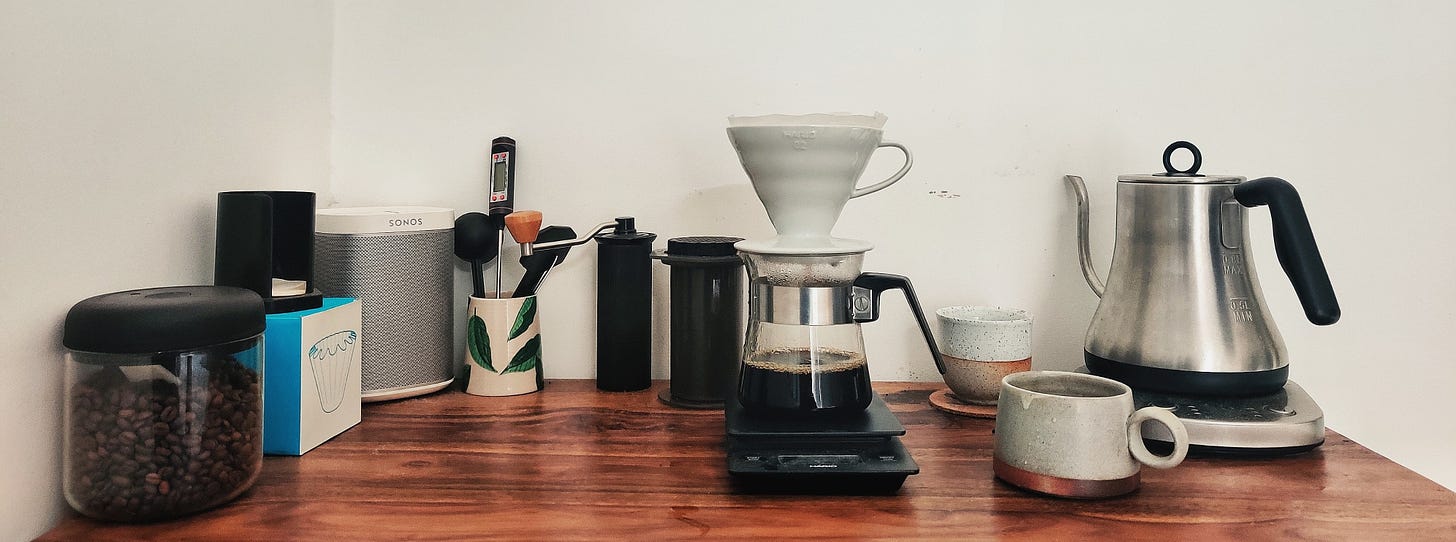Caffeine explained in exactly 500 words
Caffeine is my favorite drug.
Every morning, before I start my day, I brew myself a cup of coffee. As the caffeine enters my system, I transform from a groggy, grumpy person, to a fully awake, slightly less grumpy person.
If you’ve ever wondered whether your love for caffeine was harming you, I finally have an answer. As with most complex questions, the answer is – “It depends”.
Specifically, it depends on your position on the curve.
Which curve? This one.
Consuming up to 400mg of caffeine (4 small cups of coffee) per day can be good for you. It ramps up your body’s ability to burn fat, improves your mood, decreases the likelihood of depression, stimulates your brain, and protects against Alzheimer's and Parkinson's disease.
However, anything over that amount will harm you. As shown on the Caffeine Curve, ingesting 10g of caffeine can kill you.
Since it’s unlikely that you’re on the verge of dying from drinking 100 cups of coffee, let’s move on to understanding how caffeine works.
But first, let me take you on a short detour about adenosine.
Understanding adenosine
Your body gets energy by breaking down a molecule called ATP (Adenosine Triphosphate). As is obvious, one of the things it breaks it down into is the ‘A’ in ATP – Adenosine.
The cells in your body have receptors for adenosine – think of these as puzzle pieces into which the adenosine molecules fit perfectly, and thereby trigger a downstream reaction.
These reactions result in your body getting ready for bed. They make you sleepy, slow down your heartbeat, regulate your bladder, calm your muscles, and make you feel more at peace and less ‘pumped’ about life.
Okay, detour over. Now back to caffeine.
Caffeine - The Imposter
Caffeine’s molecular structure is similar to that of adenosine.
It’s so similar, that adenosine receptors confuse it for adenosine itself. When you consume a caffeinated beverage, these caffeine molecules bind to adenosine receptors, leaving adenosine out in the cold.
However, since caffeine isn’t identical to adenosine, it doesn’t trigger the same downstream reactions that adenosine would’ve.
As a result, you don’t feel sleepy, your heartbeat doesn’t slow down, your muscles don’t calm down, and you still feel pumped about life.
Caffeine doesn’t actually stimulate you via a direct shot of energy; it just makes you feel energetic by stopping bodily processes that would otherwise make you feel tired.
Don’t overdo it
As you already know, anything in excess is usually bad.
When you consume too much caffeine, eventually, your body catches up. It creates more adenosine receptors for the adenosine that’s feeling left out.
When this happens, you need to consume more caffeine to continue feeling pumped about life. If you stopped, you’d experience a caffeine crash. This results in a vicious cycle of caffeine consumption, with Starbucks being the biggest winner.
The only way out is to gradually reduce your caffeine consumption till your adenosine receptor levels have normalized.
Once that happens– consume caffeine moderately and live your best life.
This issue is sponsored by Explorer Cold Brew.
As the first part of their name suggests, they’re a company built and run by an actual explorer. His name’s Cason, and he’s a famous guy. He’s climbed all seven summits, and even has his own Wikipedia page.
As the second part of their name suggests, they sell cold brew coffee. In what I think is a first, they have options with varying levels of caffeine.
Take your pick, based on which part of the caffeine curve you’re currently at. They offer a 100% satisfaction guarantee, to make sure you’re not disappointed with your purchase.
Use the code COMPLEXITY10 to save an extra 10% on your order.
As always, if you enjoyed this week’s newsletter, please feel free to share it.
And if you’re in the mood, hit the like button below.











The author didn’t address caffeine tolerance. It seems the author doesn’t think caffeine tolerance develops. But since the author does call it a drug, he should state whether he does or doesn’t believe tolerance develops. Otherwise it could be a misleading article. From what I read caffeine tolerance can develop in as little as 3 days. So I wish the author would share his opinion, do people develop a tolerance for caffeine? And if they do what’s the answer to sustaining the benefits of caffeine and if they don’t this is a big point to discuss. Especially since the post has been sponsored by a coffee company.
Brilliant explanation of all things caffeine! The illustrations are so simple and straightforward, combined with the easy flowing text, made me feel as though I could comprehend effortlessly. If only every textbook, manual and guidebook were to adopt this format, the world would be a much easier place to navigate. I'm all in.